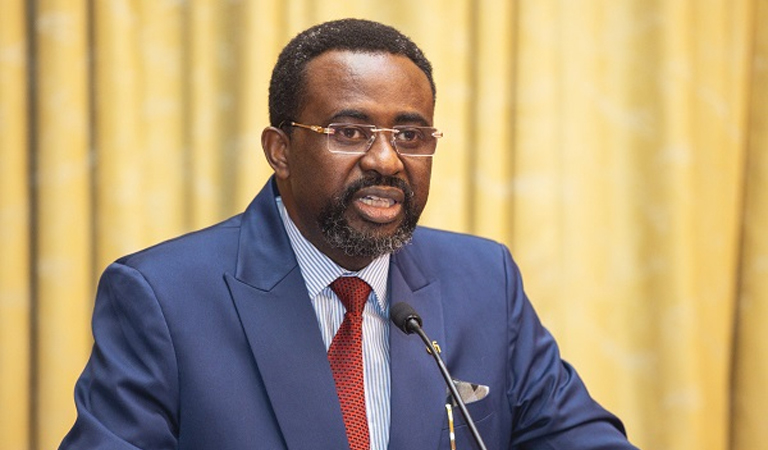Urges Them to Boost SMEs, Fund Infrastructure, and Expand Digital Access.
The Bank of Ghana Governor, Dr. Johnson P. Asiama, in an engagement meeting with Chief Executive Officers of banks in Ghana at the Bank of Ghana MPC Room, Accra, on Wednesday, 13th August 2025, urged them, as leaders of the sector, to translate stability into growth; channel more credit into productive enterprises, support SMEs, finance critical infrastructure, and leverage digital innovations to reach underserved markets.
Speaking on the theme, “Translating Macroeconomic Gains into Sustainable Banking Sector Growth”, the BoG Governor indicated that to boost SMEs, fund infrastructure, and expand digital access, it will require sound risk governance, unwavering compliance, and a willingness to rethink business models, considering changing customer needs, technological disruption, and climate and sustainability challenges.
“At the Bank of Ghana, we are committed to engaging with you constructively, providing clear regulatory guidance, and supporting innovations that enhance the resilience and competitiveness of Ghana’s financial system,” the Governor said, affirming the Bank of Ghana’s support for the various banks.
At the engagement meeting with Chief Executive Officers of banks following the July Monetary Policy Committee (MPC) meetings, Dr. Asiama described the gathering as a strategic platform for aligning banking strategies with monetary policy to reinforce recent macroeconomic gains.
Reviewing recent economic developments, Dr. Asiama noted that Ghana’s economy expanded by 5.3 percent in the first quarter of 2025, with non-oil GDP at 6.8 percent, driven by strong agricultural output and a buoyant services sector.
The Composite Index of Economic Activity rose 4.4 percent year-on-year in May, while business and consumer confidence have strengthened on the back of easing inflation and a stable currency.
Inflation fell to 12.1 percent in August from 13.7 percent in June, the lowest in nearly four years, with expectations anchored across households, businesses, and the financial sector.
Fiscal consolidation has also improved, with the budget deficit at 0.7 percent of GDP in the first half of 2025, below the 1.8 percent target.
On the external front, gross international reserves reached US$11.1 billion by end of June, covering 4.8 months of imports, while the cedi has appreciated over 40 percent against the US dollar year-to-date.
Following these developments, the MPC cut the policy rate by 300 basis points to 25.0 percent, signaling a cautious shift toward supporting growth while maintaining disinflation progress.
Dr. Asiama said the banking sector remains well-capitalized, liquid, and profitable, with non-performing loan ratios declining due to improved credit standards and the favorable macroeconomic environment. He urged banks to stimulate lending to the private sector without compromising asset quality.
The Governor announced forthcoming measures to strengthen resilience, transparency, and compliance.
These include a new Credit Risk Management Directive aligned with Basel principles, a Bancassurance Directive, a Large Exposures Directive to limit concentration risks, and new guidelines on credit concentration to encourage diversification.
On liquidity and capital resilience, a forthcoming Liquidity Risk Management Directive will require banks to hold sufficient high-quality liquid assets to cover 30-day stress scenarios, while closing loopholes related to reserve requirements and clarifying the treatment of e-money float accounts.
He also outlined a framework for managing interest rate risk, strengthening capital planning, and embedding robust stress testing.
On foreign exchange operations, the Governor mentioned that the Bank of Ghana will strictly enforce compliance with the Foreign Exchange Act and inward remittance guidelines, prohibiting unapproved remittance terminations and FX swaps within remittance operations.
All banks and payment service providers must submit weekly inward remittance reports detailing transactions and FX credits to Nostro accounts, with sanctions for non-compliance.
In addition, the central bank will conduct a strategic business model review to assess the sustainability of banks’ operations, requiring the full engagement of boards and senior management.
Dr. Asiama emphasized that with a stable macroeconomic base, a robust banking sector, and forward-leaning regulations, the onus is on bank leaders to drive sustainable growth.
This, he said, would require strong risk governance, full compliance, and adaptability to changing customer needs, technological shifts, and climate-related challenges.
He urged participants to view the engagement not as a compliance checklist but as a strategic dialogue on the future of banking in Ghana, stressing that “the stability we enjoy today was hard-won” and must now be leveraged for inclusive prosperity.
By Prince Ahenkorah


